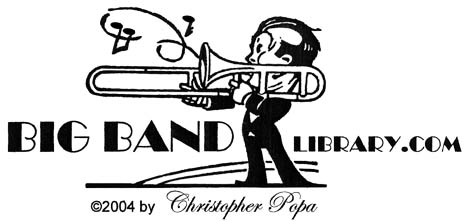
vital stats:
given name Elmer Lewis Dunham
birth Nov. 16, 1911, Brockton, MA
death Jul. 9, 1990, Miami, FL, cancer
father Elmer M. Dunham
mother Ethel A. (Lewis) Dunham
sister [ played trumpet ]
sister Louise, b.1936, d.1940, a professional saxophonist
education Massachusetts public schools
residences 70 Orange St., Brooklyn, NY (1950s); Miami, FL (1960s- )
Dunham had learned how to play the valve trombone at age 7, was part of a family instrumental quartet at 10, added the slide trombone the following year, and played his first date with a band at 13.
Around 1930, one of his sisters gave him her trumpet, and, after he mastered the basics of that horn, he began to double on it and the trombone professionally.
He joined Glen Gray's Casa Loma Orchestra in 1932 as a trumpeter, though he sang at least one song (a May 17, 1932 Brunswick recording of I Never Knew, with fellow band members Pee Wee Hunt and Clarence Hutchinrider).
Dunham left the orchestra in March 1937, but returned within a number of months, in time for his high-pitched trumpet to be featured on Memories of You, which they recorded for Decca on December 1, 1937. That tune became his "signature."
Among the Casa Loma Orchestra's other recordings was Dunham's original composition, Come and Get It, made on September 28, 1939.
Spurred by those achievements (and his Metronome poll award), he decided to go out on his own and formed a big band, which debuted at Glendale Civic Auditorium, near Los Angeles, in July 1940.
Though they never really had a hit record, Dunham's band did manage to play many of the top venues across the U.S., including two 13-week and one 16-week engagements at the Hotel New Yorker in New York City.
Among other places where they performed were the Meadowbrook in Cedar Grove, NJ; the Paramount Theatre and the Cafe Rouge of the Hotel Pennsylvania in New York City; the Earle Theatre in Philadelphia; the Palladium in Hollywood; Eastwood Gardens in Detroit; the RKO Theatre in Boston; and the Hotel Sherman in Chicago.
"Mr. Dunham is a slightly cynical looking gent with a mania for molten music," Davidson remarked in the Chicago Daily Tribune in 1943.
Dunham and his band also made a number of repeat appearances on the "Spotlight Bands" radio show sponsored by Coca-Cola, as well as several motion pictures, film shorts, and soundies.
Musicians who worked with his band included, at various times, Uan Rasey, Nick Buono, Paul Cohen, and Pete Candoli (trumpets), Kai Winding and Frank Comstock (trombones), Corky Corcoran, Musky Ruffo, Bob Dukoff, Zoot Sims, Johnny Bothwell, and Billy Usselton (saxophones), Stan Wrightsman (piano), Irv Cottler and Don Lamond (drums), Ray Kellogg, Dorothy Claire, and The Sonnysiders [which included Harold Grogan] (vocals), and George Williams and Hal Mooney (arrangers).
Dunham disbanded in the fall of 1951, then reorganized not too long after that.
For nearly thirty more years, he continued to make music - though by the 1960s, he had cut back to a quintet and confined himself to the trombone almost exclusively.
He found employment on cruise ships, including the S.S. Argentina in 1964, and booked similar units for other excursions.
In the 1970s, he was heard as the trombonist with The Lords of Dixieland sextet on a number of LPs recorded in Florida and issued on the Jazz Forum label. The titles included "Washington & Lee Swing" (catalog no. CR 2002), "All That Jazz" (CR 2014), "St. Louis Blues" (CR 2015), and "Bourbon Street Parade" (CM 1087).
Dunham stopped playing in 1982.
sources:
Eugene Chadbourne, "Sonny Dunham," on allmusic.com.
Will Davidson, "Dunham's Music at Sherman Matches Summer Heat," Chicago Daily
Tribune, Jul. 18, 1943, p.E4.
Leonard Feather, "Dunham, Elmer Lewis (Sonny)," in The Encyclopedia of Jazz
(New York City: Horizon Press, 1955), p.186.
Leonard Feather and Ira Gitler, "Dunham, Sonny (Elmer Lewis)," in The Biographical
Encyclopedia of Jazz (New York City: Oxford University Press, Inc., 1999), p.196.
Charles Garrod, Sonny Dunham and His Orchestra (Zephryhills, FL: Joyce Record Club,
1990).
Charles Garrod and Bill Korst, Glen Gray and the Casa Loma Orchestra (Zephryhills, FL:
Joyce Record Club, 1987).
Roger D. Kinkle, "Dunham, Sonny," in The Encyclopedia of Popular Music and Jazz
1900-1950: Volume 2, Biographies A Through K (New Rochelle, NY: Arlington House
Publishers, 1974), p.845.
Stefan Meyer, liner notes, "Sonny Dunham and His Orchestra 1943-1944" (Circle CLP-85),
1986.
OCLC WorldCat Database.
Social Security Death Index.
"Sonny Dunham," en.wikipedia.org.
Leo Walker, "Sonny Dunham," in The Big Band Almanac (New York City: Da Capo Press
Inc., 1989), pp.110-112.
I would like to expand this tribute, if possible, with a new interview of someone who was important to Sonny Dunham's life and career. Are you an alumnus of his band, a member of his family, or a collector who is knowledgeable about his accomplishments? Please contact me via e-mail
return to "Biographical Sketches" directory
go to Big Band Library homepage
The big bands are back
in a new and exciting way!
SONNY DUNHAM
"MEMORIES OF YOU"
by Music Librarian CHRISTOPHER POPA
October 2008
He could play either the trumpet or the trombone, which was unusual.
"There's something about the lip technique of one that clashes with the other," music critic Will Davidson once explained. "To attempt to learn both leaves the student, so goes the legend, wide open to the loss of ability with either instrument."
Dunham termed his talent of playing both instruments a "dual embouchure."
Still, when he won a chair in the first Metronome poll in 1939, it was as a trumpeter.

Sonny Dunham, 1941